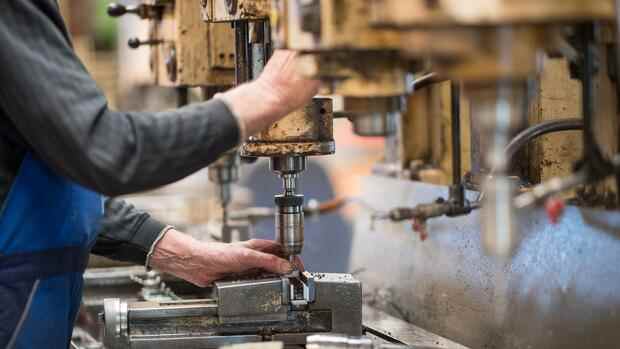The shortage of skilled workers weighs on the mood of entrepreneurs.
(Photo: dpa)
Berlin High energy and raw material prices as well as delivery bottlenecks are clouding the business expectations of companies in Germany. Against this background, the Association of German Chambers of Industry and Commerce (DIHK) is lowering its growth forecast for this year.
Growth in gross domestic product (GDP) of 3.0 percent is now expected, after 3.6 percent previously. “Companies are quite disappointed with their current situation,” said DIHK General Manager Martin Wansleben on Friday. “This means that we will probably not reach the pre-crisis level of our economic output until the middle of the year.”
The forecast three percent are rather optimistic. Statistically, the DIHK could have gone down to 2.8 percent in the GDP projection. The federal government lowered its forecast in January, but only to 3.6 percent.
The economic institutes are still moving in this area. However, the ongoing pandemic situation and only slow improvement in the supply bottlenecks are likely to mean that other economic researchers will also follow the DIHK.
Top jobs of the day
Find the best jobs now and
be notified by email.
This bases its findings on a survey of 28,000 companies. They indicated the high energy prices as the greatest burden. 64 percent see this as the greatest business risk. Industrial companies are particularly affected, the figure here is 85 percent. In addition, the shortage of skilled workers causes problems. This was stated by 61 percent of those surveyed.
Criticism of a possible postponement of the super write-offs
The economy assesses both its current situation and the outlook for 2022 as a whole more negatively than in the last DIHK survey. Just under a quarter of the companies still expect better business in the next twelve months.
“The economy is holding its breath,” said Wansleben. A cautiously optimistic mood still prevails in the companies. “However, many do not know how to proceed due to great uncertainty.”
The majority of companies expect the material bottlenecks to last longer. Only ten percent expect a clear decline in the first half of 2022.
Especially the companies with a strong domestic business could hardly compensate because the demand is not so great. On the other hand, the situation for strong export companies is much better, especially in mechanical engineering. “It’s no surprise that they export no matter what,” said Wansleben.
The investment activity of companies is also problematic. Wansleben calls for incentives to be set quickly. Finance Minister Christian Lindner (FDP) apparently does not want to start the investment premium for climate protection and digitization announced in the coalition agreement until next year in the form of super write-offs.
Among other things, it is argued that the companies wanted to invest more anyway after the supply bottlenecks had been eliminated. Wansleben considers this a mistake: “The investment plans are as assumed.” The super write-offs need it promptly.
with agency material
More: Investment backlog in companies jeopardizes prosperity
